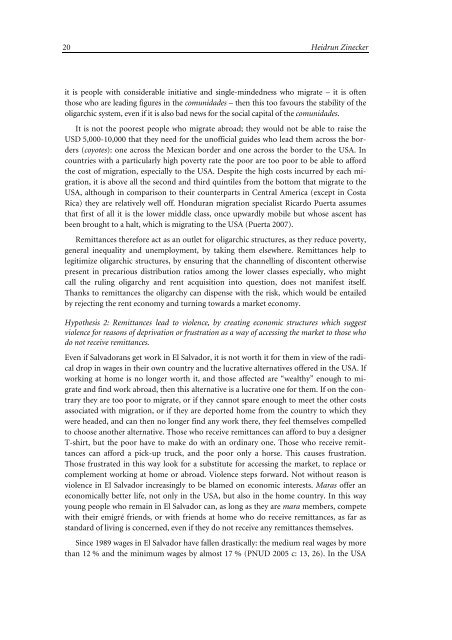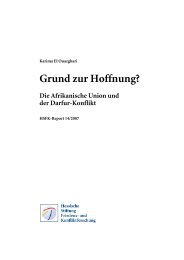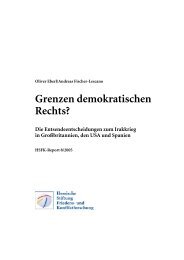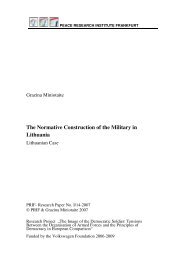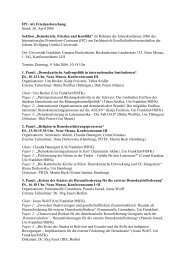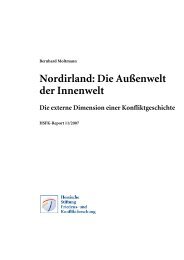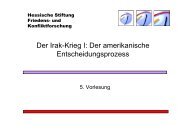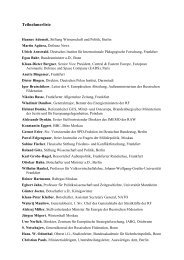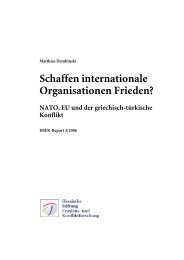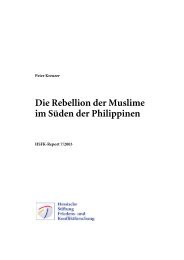From Exodus to Exitus Causes of post-war violence in El ... - eDoc
From Exodus to Exitus Causes of post-war violence in El ... - eDoc
From Exodus to Exitus Causes of post-war violence in El ... - eDoc
You also want an ePaper? Increase the reach of your titles
YUMPU automatically turns print PDFs into web optimized ePapers that Google loves.
20 Heidrun Z<strong>in</strong>ecker<br />
it is people with considerable <strong>in</strong>itiative and s<strong>in</strong>gle-m<strong>in</strong>dedness who migrate – it is <strong>of</strong>ten<br />
those who are lead<strong>in</strong>g figures <strong>in</strong> the comunidades – then this <strong>to</strong>o favours the stability <strong>of</strong> the<br />
oligarchic system, even if it is also bad news for the social capital <strong>of</strong> the comunidades.<br />
It is not the poorest people who migrate abroad; they would not be able <strong>to</strong> raise the<br />
USD 5,000-10,000 that they need for the un<strong>of</strong>ficial guides who lead them across the borders<br />
(coyotes): one across the Mexican border and one across the border <strong>to</strong> the USA. In<br />
countries with a particularly high poverty rate the poor are <strong>to</strong>o poor <strong>to</strong> be able <strong>to</strong> afford<br />
the cost <strong>of</strong> migration, especially <strong>to</strong> the USA. Despite the high costs <strong>in</strong>curred by each migration,<br />
it is above all the second and third qu<strong>in</strong>tiles from the bot<strong>to</strong>m that migrate <strong>to</strong> the<br />
USA, although <strong>in</strong> comparison <strong>to</strong> their counterparts <strong>in</strong> Central America (except <strong>in</strong> Costa<br />
Rica) they are relatively well <strong>of</strong>f. Honduran migration specialist Ricardo Puerta assumes<br />
that first <strong>of</strong> all it is the lower middle class, once up<strong>war</strong>dly mobile but whose ascent has<br />
been brought <strong>to</strong> a halt, which is migrat<strong>in</strong>g <strong>to</strong> the USA (Puerta 2007).<br />
Remittances therefore act as an outlet for oligarchic structures, as they reduce poverty,<br />
general <strong>in</strong>equality and unemployment, by tak<strong>in</strong>g them elsewhere. Remittances help <strong>to</strong><br />
legitimize oligarchic structures, by ensur<strong>in</strong>g that the channell<strong>in</strong>g <strong>of</strong> discontent otherwise<br />
present <strong>in</strong> precarious distribution ratios among the lower classes especially, who might<br />
call the rul<strong>in</strong>g oligarchy and rent acquisition <strong>in</strong><strong>to</strong> question, does not manifest itself.<br />
Thanks <strong>to</strong> remittances the oligarchy can dispense with the risk, which would be entailed<br />
by reject<strong>in</strong>g the rent economy and turn<strong>in</strong>g <strong>to</strong><strong>war</strong>ds a market economy.<br />
Hypothesis 2: Remittances lead <strong>to</strong> <strong>violence</strong>, by creat<strong>in</strong>g economic structures which suggest<br />
<strong>violence</strong> for reasons <strong>of</strong> deprivation or frustration as a way <strong>of</strong> access<strong>in</strong>g the market <strong>to</strong> those who<br />
do not receive remittances.<br />
Even if Salvadorans get work <strong>in</strong> <strong>El</strong> Salvador, it is not worth it for them <strong>in</strong> view <strong>of</strong> the radical<br />
drop <strong>in</strong> wages <strong>in</strong> their own country and the lucrative alternatives <strong>of</strong>fered <strong>in</strong> the USA. If<br />
work<strong>in</strong>g at home is no longer worth it, and those affected are “wealthy” enough <strong>to</strong> migrate<br />
and f<strong>in</strong>d work abroad, then this alternative is a lucrative one for them. If on the contrary<br />
they are <strong>to</strong>o poor <strong>to</strong> migrate, or if they cannot spare enough <strong>to</strong> meet the other costs<br />
associated with migration, or if they are deported home from the country <strong>to</strong> which they<br />
were headed, and can then no longer f<strong>in</strong>d any work there, they feel themselves compelled<br />
<strong>to</strong> choose another alternative. Those who receive remittances can afford <strong>to</strong> buy a designer<br />
T-shirt, but the poor have <strong>to</strong> make do with an ord<strong>in</strong>ary one. Those who receive remittances<br />
can afford a pick-up truck, and the poor only a horse. This causes frustration.<br />
Those frustrated <strong>in</strong> this way look for a substitute for access<strong>in</strong>g the market, <strong>to</strong> replace or<br />
complement work<strong>in</strong>g at home or abroad. Violence steps for<strong>war</strong>d. Not without reason is<br />
<strong>violence</strong> <strong>in</strong> <strong>El</strong> Salvador <strong>in</strong>creas<strong>in</strong>gly <strong>to</strong> be blamed on economic <strong>in</strong>terests. Maras <strong>of</strong>fer an<br />
economically better life, not only <strong>in</strong> the USA, but also <strong>in</strong> the home country. In this way<br />
young people who rema<strong>in</strong> <strong>in</strong> <strong>El</strong> Salvador can, as long as they are mara members, compete<br />
with their emigré friends, or with friends at home who do receive remittances, as far as<br />
standard <strong>of</strong> liv<strong>in</strong>g is concerned, even if they do not receive any remittances themselves.<br />
S<strong>in</strong>ce 1989 wages <strong>in</strong> <strong>El</strong> Salvador have fallen drastically: the medium real wages by more<br />
than 12 % and the m<strong>in</strong>imum wages by almost 17 % (PNUD 2005 c: 13, 26). In the USA


